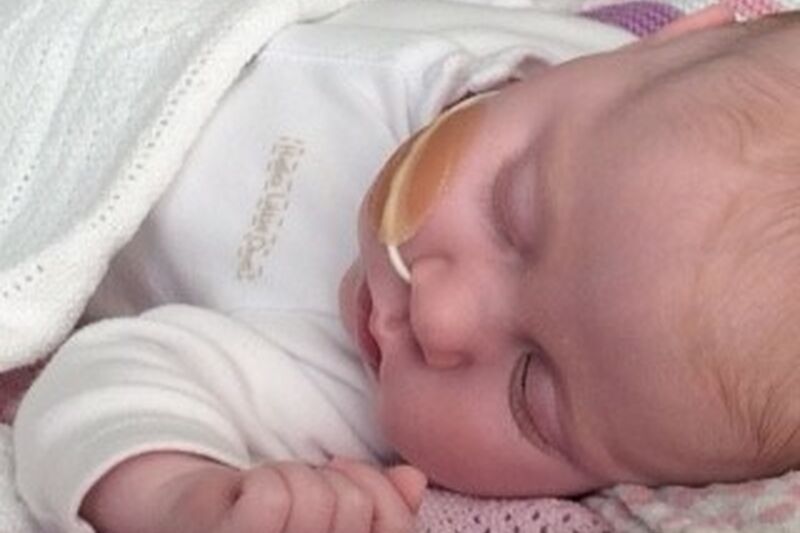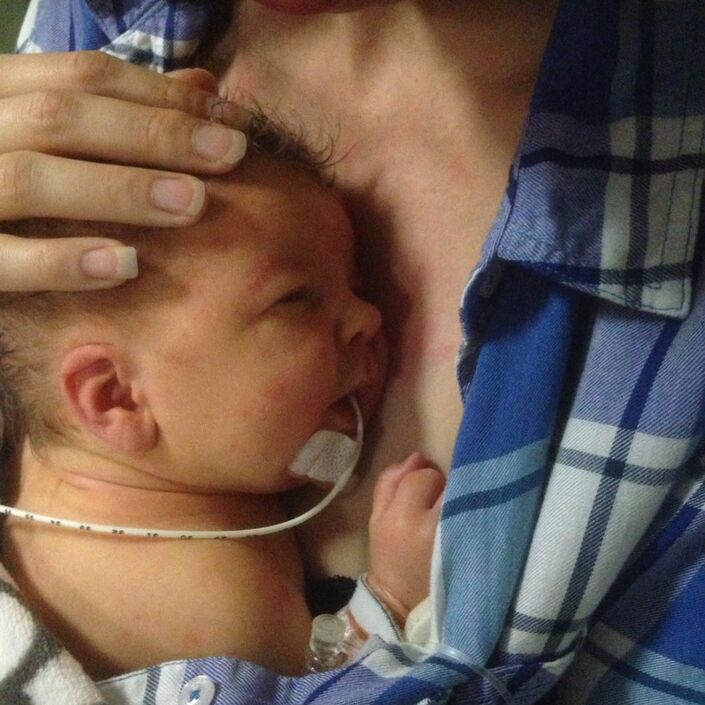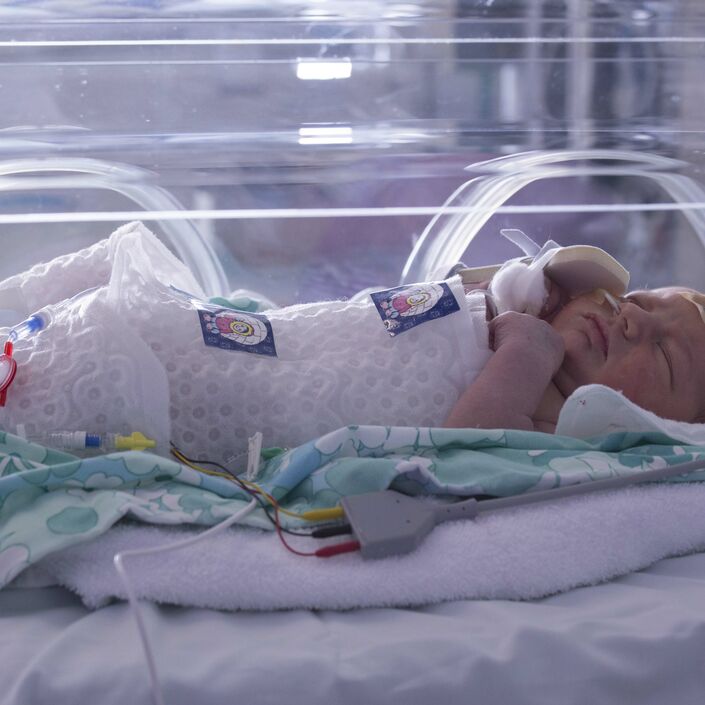My daughter Heidi was born on Mother's Day and she was the best present I could have wished for.
Everything was fine, for the first hour at least.
The midwife came to take her to be cleaned and weighed, but as soon as she picked her up I knew something was wrong. She was floppy, like a rag doll. The midwife put her in the incubator and got the oxygen on her. Strangely, at this stage I didn’t panic. I’d seen this on TV, and thought she just needed a bit of help and she’d be fine. But she didn’t cry. She didn’t even move.
As soon as the midwife hit the call button I knew that things were going horribly wrong. The room filled with people who started to resuscitate our baby girl. People kept coming and all we could do was watch, completely helpless.

She was taken to the NICU and a consultant explained that they wanted to transfer her to another hospital to be ‘cooled.’ I hadn’t heard of this before, but they said it was the best thing for her. It would involve her core temperature being cooled to minimise the impact of brain injury. She explained that Heidi was suffering from lack of oxygen and that there could be severe complications further down the line. I remember saying “as long as there is a further down the line”, as the reality of the situation started to kick in.
We both had a short time with Heidi in NICU as the transport team made arrangements to move her. We couldn’t hold her, but I had a word with her. I said we’d see her very soon and that I loved her.
After Heidi was transferred and I was waiting to be discharged I rang my mum, which was quite possibly the hardest thing I have ever had to do. I tried to hold it together long enough to say congratulations for becoming a grandma, but I think she could tell instantly by my shaky voice that something was wrong.
We arrived at the unit the morning after Heidi was born. I think my chin wobbled the whole way down the corridor as I desperately tried to hold back the tears, but when I saw Heidi in the incubator I just burst. She looked so little and I just wanted to pick her up, but of course I couldn’t. We were allowed to touch her through the incubator doors, so we gently stroked her arm and told her we were there.
One of the first nurses we saw was actually a girl I went to school with, more years ago than I care to admit. It was so lovely to see a familiar face while we were in such alien surroundings, and she gave me the biggest hug.
For the first three days Heidi was completely unresponsive, which was to be expected. We had been prepared for the worst, and reading up on HIE (Hypoxic-ischaemic encephalopathy) afterwards, we discovered that many babies didn’t survive the first 24 hours. I’m glad I didn’t know this at the time.

Once the cooling was complete, she was slowly warmed back up and all we could do was wait and see how she was. This was also when we got to hold Heidi for the first time. It wasn’t quite the cuddle a mum would have hoped for, but I was over the moon. We had a little chat, and I made it quite clear that she had to start playing by the rules now - she had caused us enough worry and she was only four days old!
We soon got into our NICU routine, and I had several more chin-wobbling moments, but I also had times of feeling optimistic and the need to be strong for our little girl.
Heidi was in the NICU for ten days, and we were lucky enough to be able to stay at one of the parent rooms in the hospital, which was just across the corridor. I really don’t know how I would have managed if we’d had to come home each night without her.
Eventually, Heidi was moved to a high dependency unit at another hospital. When we arrived she looked quite grown up compared to how she had been in the incubator. The nurses there were lovely as well and we soon built up relationships with them all. They encouraged us to do all of Heidi’s ‘cares’ and we tried to do as much as we could for her. Each day she was getting stronger and her fighting spirit was shining through.
After two weeks the decision was made to transfer her to the children’s unit, which was great for us as it meant one step closer to home. We also had our own room, which meant we could be with Heidi all the time, and one of us could stay with her overnight. We were so excited, but this didn’t last long.
Whether it was the change of environment, the increase in feeds, or just one of those days, Heidi couldn’t have played up more. I think she must have been testing us to see if we were up to this parenting malarkey! She needed constant attention and her alarms were continually going off. We couldn’t take our eyes off her for one minute.
After an exhausting night, where neither of us got any sleep, we sat on the bed and cried. It was the first and only time when we have both struggled at the same time. Usually we’d take it in turns to have a wobble, and manage to pick each other up, but this was different. We felt like we couldn’t look after our own daughter. Reality had hit home - Heidi would need significant care and we didn’t know what the future would hold.
Somehow we managed to pick ourselves up - I don’t know how, but we did. We talked a lot and reminded ourselves what we have to be thankful for. We decided to do all we could for Heidi, and make sure she had the best possible care.
Slowly things improved, we managed to snatch the odd hour of sleep, and got into a routine. The rest of the time was far less traumatic. We started to learn about each other, and we even started to have fun.
Eventually a date was set for Heidi to come home on oxygen. We didn’t dare to believe, just in case something happened, but we had our discharge meeting and were given the ok.
It was emotional leaving the unit, we hugged and cried as we said our goodbyes, but I felt like the proudest mum ever as I pushed the pram out of the hospital. We were ready for the next part of our journey and it was time for the fun to really begin.
Heidi is now at home and is doing well. She has complex care needs and has been diagnosed with Cerebral Palsy. She also has a tracheostomy and is hearing and visually impaired. We have learned to celebrate ever small development. She is doing much better than many though she would in those early days, and we have learnt to enjoy life with her. She is aware of her surroundings and has her own way of communicating with us - we certainly know if she isn't happy!

How is Bliss helping to improve care for babies like Heidi?
Bliss is supporting Vânia Oliveira, a Research Nurse at Imperial Hospital, who is looking to see if monitoring the variability of a baby’s heartbeat can help detect brain injury. This could identify babies that need cooling treatment who show no other signs of brain injury, improving the care they are given. Cooling has been shown to reduce death and significantly improve long-term development for babies. It is hoped that by doing this work more babies can benefit from being cooled.
Find out more about Bliss' involvement in research here.


